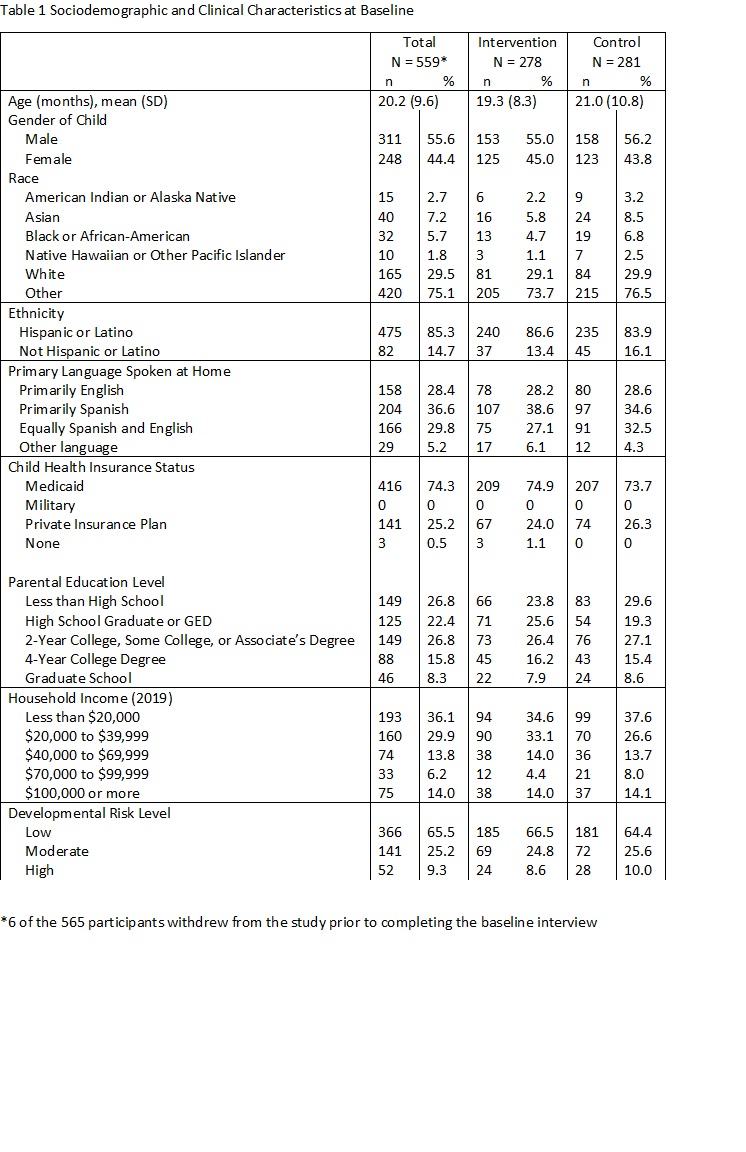Health Services Research
Category: Abstract Submission
Health Services Research III
5 - Early Childhood Developmental Care Coordination through 2-1-1: Findings from a Randomized, Controlled Trial
Monday, April 25, 2022
3:30 PM - 6:00 PM US MT
Poster Number: 5
Publication Number: 5.414
Publication Number: 5.414
Bergen B. Nelson, Children's Hospital of Richmond at VCU, Richmond, VA, United States; Rebecca Dudovitz, University of California Los Angeles, Los Angeles, CA, United States; Lindsey R. Thompson, Kaiser Permanente Bernard J. Tyson School of Medicine, Pasadena, CA, United States; Sitaram Vangala, UCLA Department of Medicine Statistics Core, Los Angeles, CA, United States; Lorena Porras-Javier, UCLA Department of Pediatrics, Los Angeles, CA, United States; Amanda Gulsrud, UCLA, Los Angeles, CA, United States; Patricia Herrera, California State University Northridge, Pasadena, CA, United States; Paul J. Chung, Kaiser Permanente Bernard J. Tyson School of Medicine, Pasadena, CA, United States

Bergen B. Nelson, MD, MS (she/her/hers)
Associate Professor
Children's Hospital of Richmond at VCU
Richmond, Virginia, United States
Presenting Author(s)
Background: Routine early childhood developmental screening is recommended in pediatric primary care. Despite improvements in practice, many children with suspected developmental delays are not connected to intervention services due to family-, practice- and systems-level barriers. Developing solutions that improve both identification of delays and connections to services may dramatically improve child developmental outcomes.
Objective: To test the effectiveness of a telephone-based early childhood development care coordination intervention through 2-1-1.
Design/Methods: The 2-1-1 health and human services call center in Los Angeles County (211LA) has operated an early childhood developmental screening and care coordination program since 2009. We sought to test the effectiveness of this model, compared to usual primary care alone, in connecting young children to services. We conducted a randomized controlled trial in partnership with 4 clinical systems serving mainly lower-income families in LA, recruiting and randomizing children between 12-42 months to receive care coordination through 211LA or usual care alone, stratifying by clinic and baseline developmental risk. Children in the intervention group were connected to a 211LA care coordination specialist who reviewed results of a validated developmental screening tool, made referrals to services as indicated, and conducted follow-up with families and service providers as needed. Telephone interviews with parents were conducted at baseline and 6 months after enrollment to measure referrals, services, and sociodemographic characteristics. Logistic regression with random clinic effects was used to compare outcomes across intervention and control groups.
Results: A total of 565 children aged 12-42 months (mean age = 20.2 months) were enrolled (Figure 1 and Table 1), with 512 (90.6%) completing the 6-month follow-up survey (249=Intervention, 263=Control). Of these, 178 (34.8%) were screened as having moderate or high developmental risk at baseline (83=Intervention, 95=Control). After 6 months, children in the intervention group with moderate or high risk were more likely than their control group counterparts to be referred to services (52% vs 31%, p = 0.004) and Early Head Start/Head Start (53% vs. 7%, p < 0.001) and more likely to be enrolled in such services (33% vs. 18% in EI, p = 0.024; 19% vs. 2% in Early Head Start or Head Start, p=0.002; Table 2).Conclusion(s): Care coordination through 211LA is a highly effective strategy to increase referrals to, and enrollments in, early childhood services, compared to usual pediatric primary care alone.
Figure 1.jpg) CONSORT Diagram of Randomized Trial Sample Recruitment
CONSORT Diagram of Randomized Trial Sample Recruitment
Table 1 Sociodemographic characteristics of baseline sample
Sociodemographic characteristics of baseline sample
Objective: To test the effectiveness of a telephone-based early childhood development care coordination intervention through 2-1-1.
Design/Methods: The 2-1-1 health and human services call center in Los Angeles County (211LA) has operated an early childhood developmental screening and care coordination program since 2009. We sought to test the effectiveness of this model, compared to usual primary care alone, in connecting young children to services. We conducted a randomized controlled trial in partnership with 4 clinical systems serving mainly lower-income families in LA, recruiting and randomizing children between 12-42 months to receive care coordination through 211LA or usual care alone, stratifying by clinic and baseline developmental risk. Children in the intervention group were connected to a 211LA care coordination specialist who reviewed results of a validated developmental screening tool, made referrals to services as indicated, and conducted follow-up with families and service providers as needed. Telephone interviews with parents were conducted at baseline and 6 months after enrollment to measure referrals, services, and sociodemographic characteristics. Logistic regression with random clinic effects was used to compare outcomes across intervention and control groups.
Results: A total of 565 children aged 12-42 months (mean age = 20.2 months) were enrolled (Figure 1 and Table 1), with 512 (90.6%) completing the 6-month follow-up survey (249=Intervention, 263=Control). Of these, 178 (34.8%) were screened as having moderate or high developmental risk at baseline (83=Intervention, 95=Control). After 6 months, children in the intervention group with moderate or high risk were more likely than their control group counterparts to be referred to services (52% vs 31%, p = 0.004) and Early Head Start/Head Start (53% vs. 7%, p < 0.001) and more likely to be enrolled in such services (33% vs. 18% in EI, p = 0.024; 19% vs. 2% in Early Head Start or Head Start, p=0.002; Table 2).Conclusion(s): Care coordination through 211LA is a highly effective strategy to increase referrals to, and enrollments in, early childhood services, compared to usual pediatric primary care alone.
Figure 1
.jpg) CONSORT Diagram of Randomized Trial Sample Recruitment
CONSORT Diagram of Randomized Trial Sample RecruitmentTable 1
 Sociodemographic characteristics of baseline sample
Sociodemographic characteristics of baseline sample